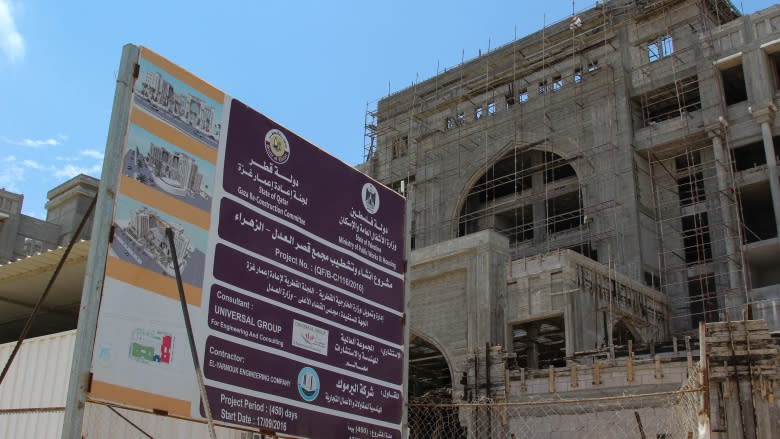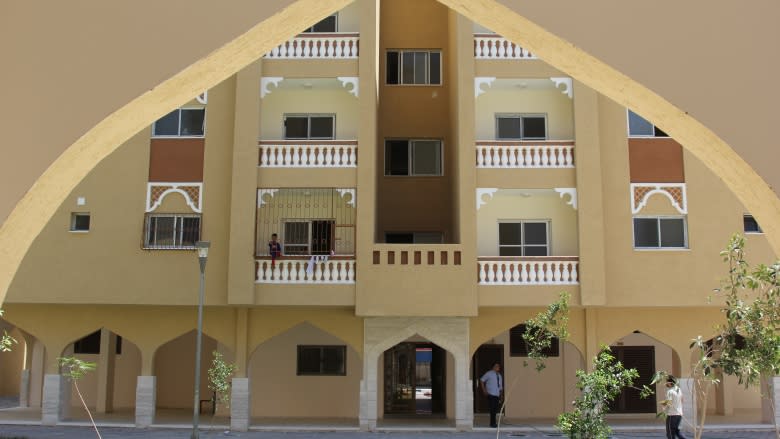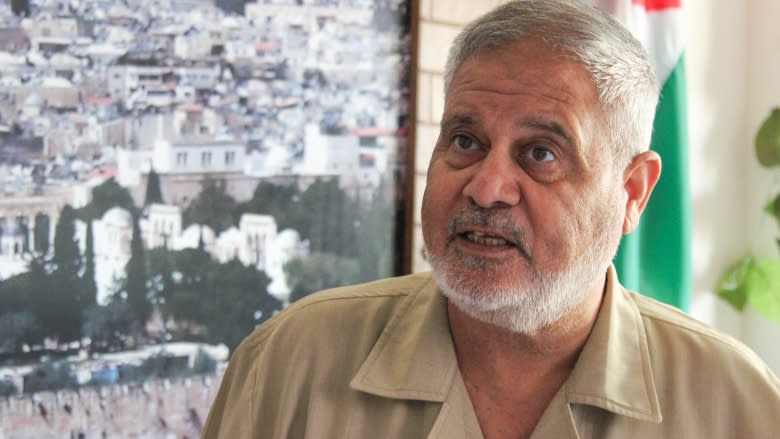Palestinians in Gaza worry they could suffer in simmering Gulf dispute
The purple signs featuring the emblem of Qatar have become a common sight in the southern part of the Gaza Strip, where the government of the tiny Gulf emirate has become a lifeline for many Palestinians, especially the poor.
The signs sit on the edges of major construction sites, including the large housing projects Qatari cash is paying for, and a new Palace of Justice, which soon will be home to a courthouse complex.
At the Palace, dozens of construction workers owe their livelihoods to Qatar, which has paid more than $13 million for the project, expected to open later this year.
"If it wasn't for Qatar, we'd be sitting here doing nothing. I'd have no work, for sure," said bricklayer Ahmed Qaradaya. "Qatar is a good friend of the people of Gaza."
Qatar is by far the largest international backer of the Gaza Strip. The oil-rich emirate in the Persian Gulf has already spent millions of dollars for housing projects and upgrading roads. It has pledged a further $1.3 billion in assistance over the coming years.
But a deepening diplomatic dispute in the Gulf region could threaten to cut off the cash that flows to Gaza. Saudi Arabia and its allies have severed ties with Qatar, accusing the country of supporting terrorist groups and causing regional instability — claims the Qatari government strongly denies.
Still, at Sheikh Hamid City, Gazans are worried. Thousands of Palestinians now live in the Qatari-funded housing complex, in the southern Gaza city of Khan Younis.
The beige-coloured apartment blocks have become one of the most sought-after addresses in all of Gaza, thanks to the modern units and plentiful amenities, such as a large school and grand mosque.
"Qatar has been helping many people," said Leila Hamato, a mother of five who moved with her family from the northern Gaza Strip seven months ago.
Waiting for houses built by Qatari cash
"Yes, of course, I fear that the humanitarian projects [Qatar] provides could be under threat. Many people are still waiting for houses here and they worry," Hamato said as her children played on the lush grass between the buildings.
It's unclear how the worst diplomatic crisis in the Gulf region in decades could affect Qatar's role as the major donor to Gaza. But providing jobs is one area of concern.
Funding construction jobs
Gaza's unemployment rate sits at just over 40 per cent, according to UNRWA, the United Nations organization charged with aiding Palestinian refugees in Gaza, the West Bank and across the Middle East.
The many construction sites funded by Qatari aid provide well-paid jobs, but Gaza political analyst Mukhaimer Abu Saada wonders for how long.
"Many contractors are afraid that they might not get their money from Qatar," Abu Saada told CBC News. "Many people… who are working for the many projects here in Gaza might not get their salaries at the end of the month."
In the current diplomatic dispute, Saudi Arabia is demanding that Qatar cease its support of Hamas, the Islamic militant group that controls the Gaza Strip. (Canada and the United States, among other nations, list Hamas as a terrorist group.)
Hamas under pressure
Hamas, and other Palestinian militant groups, have fought three wars with Israel since 2008, the most recent conflict beginning nearly three years ago. Many homes destroyed in 2014 by Israeli attacks have yet to be rebuilt.
Israel accuses Hamas of using foreign money coming into the Gaza Strip to bolster its military arsenal, rather than directing the funding toward housing and other services for Gaza residents.
But senior Hamas official Ahmed Yousef told CBC News that is simply false.
"This is nonsense, because we know that the Qataris… are dealing with the… construction companies, and they deal directly with them," Yousef said. "They are not giving us the money, and also they have direct monitoring [of] their projects here in Gaza."
Qatar has also offered Hamas political support, allowing several of its leaders to reside in Doha, often in luxury. But a number of Hamas officials have reportedly recently left Qatar, in what appears to be an effort aimed at reducing the political pressure on the Qataris.
Last month Hamas released a new policy document that does not mention the organization's roots in the Muslim Brotherhood movement. The move is seen as an effort to appeal to Egypt, which has cracked down on the Brotherhood in recent years.
For now, Hamas is worried about the prospect of a drawn-out dispute between Qatar and the Saudis and its allies — and what that could mean for Gaza.
"We know that we are going to pay a price, because the situation is very complicated and the conflict [has] escalated day after day," said Yousef.







